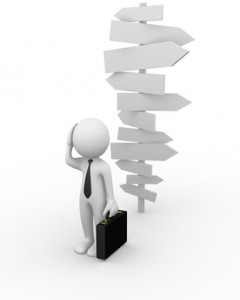Fear of the Unknown
Posted on November 14, 2012 by Tom Evans
There are known knowns; there are things we know that we know.
There are known unknowns; that is to say there are things that, we now know we don’t know.
But there are also unknown unknowns – there are things we do not know we don’t know.”— United States Secretary of Defense, Donald Rumsfeld

It’s natural for us to fear the unknown. Like all fears, this can start at an early age and remain with us for most of our lives.
When it comes to embarking on a creative project – or specifically not-embarking on a creative project – it can be somewhat debilitating.
The signs that this is happening in your life are:
- You are a bit of a control freak and won’t start working until you know exactly each step of the way
- You spend more time planning than doing
- When you start creating, doubts about your ability start to sneak in which you use as excuses to stop.
To add more complexity and confusion, there are actually classes of unknown-ness.

There’s obviously the stuff we know we know – the Known Knowns – at least that is until we find out whatever we thought we knew, we didn’t know that well after all.
There’s stuff we know we don’t know – the Known Unknowns – for example, for writers, who is going to publish our bestseller.
There’s a weird category of Unknown Knowns – these are things we know but didn’t know we knew. I love it when authors are actually quite surprised that people like reading their stuff. They were just not be quite aware of it.
Finally, as Mr Rumsfeld said, there are the Unknown Unknowns – these are the bête noires to creatives – these are the demons that can stop us in our tracks.
What we definitely do know is this diagram above is not to scale. We know for a fact there are many more things we don’t know than we do know. It is therefore illogical to fear the unknown. Rather that we should celebrate learning to know the things we don’t know.
Strategies for Getting to Know the Unknowns
1. Just accept we don’t have to know everything and getting to know things and especially making mistakes is part of the rich tapestry of life
2. Remind yourself that not trying is failure and giving it a go is success
3. Know that all you need to know is to know how to find out someone who does know
4. Learn how to use boolean searches on Google, Twitter and Wikipedia – and if you don’t know what a boolean search is or why they are useful just click here – take this as a tip from a person who knows
5. Use Mind Mapping to suppress the ‘critical’ left brain and engage the right
6. Write down three things you think you know and three things you think you don’t know – then have a think about them. Are you sure you really know the ones you think you know?
7. Learn something new every day, no matter how small.
For example, I subscribe to the Words for the Day from Dictionary.com and Visual Thesaurus so each day I improve my vocabulary. Incidentally, I also find out daily that words that I thought I knew the meaning of – I really didn’t.
By exploring what we don’t know, we find that what we thought were Known Knowns aren’t quite as Known as we think they are !
Tom Evans is the author of This We Know – a fabulous read that challenges what we know, outlined what we don’t know and postulates what we could know.
It is available in print and for Kindle …






Pingback: Seven Causes of Writer's Block - And A Cure | The Go Creative! Blog
Pingback: Preceived Lack of Talent Runs Deeper than our Ability to Write | The Go Creative! Blog
セール財布 レディース 人気